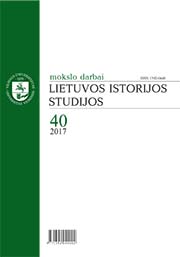HOLOKAUSTAS LIETUVOJE: ŽVILGSNIS Į VAKARŲ ISTORIOGRAFIJOS DISKURSĄ
THE HOLOCAUST IN LITHUANIA: A SIGHT TOWARD THE DISCOURSE OF WESTERN HISTORIOGRAPHY
Author(s): Stanislovas StasiulisSubject(s): Geography, Regional studies, Nationalism Studies, WW II and following years (1940 - 1949), Post-War period (1950 - 1989), Transformation Period (1990 - 2010), Fascism, Nazism and WW II, History of the Holocaust
Published by: Vilniaus Universiteto Leidykla
Keywords: the Holocaust in Lithuania; historiography; National Socialism; German occupation in Lithuania;
Summary/Abstract: The main aim of this article is to discuss the Holocaust in Lithuania as it appears in the discourse of Western historiography. This aim and the structure of this article have two goals: first, to discuss the Western historiographic perspective on the Holocaust during the period of the Cold War; second, to review the shifts in the historiography after the Cold War and the Fall of the Soviet Union. The first chapter of this article underlines that during the first period, the historiography of the Holocaust was mainly based on the sources of the Trials of the Major War Criminals (the Nuremberg Trials) and the legal proceedings during the subsequent years. This provided the foundation for historians to write studies about the Holocaust. However, these studies focused mainly on the criminal character of the Nazi party, the military and security forces, while the voices of the victims were silenced – at least until the Eichmann Trial; in addition, the question about the collaboration of locals in the Final Solution during the German occupation was also kept out. It should be underlined that this narrative was quite suitable for those Lithuanians who lived in Western Europe or the US, as it mainly stressed the guilt of the Nazi Germans. The Fall of the Soviet Union initiated a significant shift in the research of the Holocaust in Lithuania. The main factor of this shift was the opening of the archives in Eastern Europe, which provided the conditions to carry out research on the Holocaust in Lithuania. These studies made new conclusions about the relations between Lithuanians and Jews, anti Semitism in Lithuania, the anti-Soviet underground and its anti-Semitic attitudes, the first pogroms in German-occupied Lithuania during the first days of the War against the Soviet Union etc. This shift pushed the topic of the Holocaust in Lithuania to the top of the priorities of the agenda of Western historians and, in the broader sense, of the whole research centered around the persecution and eradication of the European Jews.
Journal: Lietuvos istorijos studijos
- Issue Year: 2017
- Issue No: 40
- Page Range: 93-104
- Page Count: 12
- Language: Lithuanian

